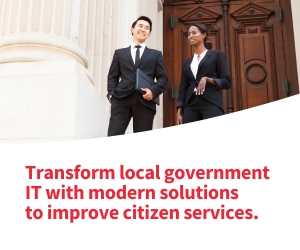Robert Reynolds, CIO for Orange County, N.C., said AI is ideal for assisting government employees with “cumbersome” and “time-consuming” tasks.
“AI will benefit local governments going forward. But like any other tool, we must have guidelines,” he said.
Without guidance, local agencies risk employees using various tools without management controls, Reynolds said. “You have to have some governance behind this as you roll it out for staff to use it.”
Local CIOs See Contractor Help for AI Assistance
Varner said that local government adoption of AI is complicated by competition for qualified workers.
“We’re in Northern Virginia, and we have competition from the private sector and our local universities for that talent,” he said. “Budgets being what they may, that is a challenge.”
Reynolds added, “I see more contracting on an as-needed basis.”
He agreed that public sector agencies are at a disadvantage when it comes to hiring AI talent.
“The amount of staff grows with the amount of work to be done,” Reynolds said. “My IT staff is 18 strong, and we support about 1,500 users. Can we support AI innovation? Probably not.”
He added, “We are right near Research Triangle Park, so we compete with higher private sector salaries.”
PTI Executive Director Alan Shark acknowledged that most small governments simply lack the resources to get started with AI.
“Most of the local governments are really small. People who would love to be here can’t. Would love to have the staff; don’t have it. Would love to have all of the greatest tools, and can’t afford it,” Shark said during the panel, which was hosted at the IBM Innovation Center in Washington.
READ MORE: State and local government CIOs expect AI to benefit digital services.
Local Agencies Slowly Test AI Use Cases
Gregory Scott, CTO and IT director for Fairfax County, Va., said that his county has polices in place and is starting small with testing AI use cases.
“We have about three initiatives that we are working on, including our own private ChatGPT,” he said. The county’s goal is to create a vision for how AI can best help government employees going forward.
Orange County is just beginning to develop potential use cases, Reynolds said. The county has empaneled a focus group of IT liaisons to explore use cases.
Skilled human beings are necessary to the success of these use cases, said James Globe, vice president of strategic adviser cybersecurity capabilities for the Multi-State Information Sharing and Analysis Center and the Elections Infrastructure Information Sharing and Analysis Center.
When governments upgrade security operations centers, they require human expertise to adjust for false positives, Globe said. “We need a skilled human.”
Local governments need skilled hires to begin their AI journeys, Globe added: “They need help to define some simple use cases and put guidelines in place.”










